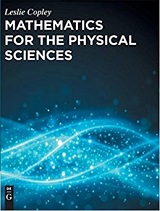
|
FreeComputerBooks.com
Links to Free Computer, Mathematics, Technical Books all over the World
|
|
- Title: Mathematics for the Physical Sciences
- Author(s) Leslie Copley
- Publisher: Sciendo (December 15, 2014);; eBook (Creative Commons Licensed, De Gruyter Open)
- License(s): CC BY-NC-ND 3.0
- Hardcover: 446 pages
- eBook: PDF (445 pages) and ePub
- Language: English
- ISBN-10/ASIN: 3110409453
- ISBN-13: 978-3110409451
- Share This:

|
This book provides a comprehensive introduction to the areas of mathematical physics. It combines all the essential math concepts into one compact, clearly written reference and illustrates the mathematics with numerous physical examples drawn from contemporary research.
About the Authors- Leslie Copley, Professor Emeritus of Physics, Carleton University, Canada.
 Similar Books:
Similar Books:
-
 Mathematics for the Physical Sciences (Herbert S. Wilf)
Mathematics for the Physical Sciences (Herbert S. Wilf)
This book provides a text for a first-year graduate level course in mathematical methods. Advanced undergraduates and graduate students in the natural sciences will receive a solid foundation in several fields of mathematics with this text.
-
 Mathematical Tools for Physics (James Nearing)
Mathematical Tools for Physics (James Nearing)
This book helps physics students learn to take an informed and intuitive approach to solving problems. It assists undergraduates in developing their skills and provides them with grounding in important mathematical methods.
-
 Mathematical Methods for Physicists (George B. Arfken, et al.)
Mathematical Methods for Physicists (George B. Arfken, et al.)
Provides aspiring engineers and scientists with key insights into mathematical concepts that they may need to understand as elementary readers. The first chapter covers all the vital concepts needed by the readers to understand the latter chapters.
-
 Mathematical Methods in Quantum Mechanics (Gerald Teschl)
Mathematical Methods in Quantum Mechanics (Gerald Teschl)
This book is a brief, but self-contained, introduction to the mathematical methods of quantum mechanics, with a view towards applications to Schrodinger operators. Very clear and detailed way and supplements it by numerous exercises.
-
 Mathematical Foundations of Quantum Theory
Mathematical Foundations of Quantum Theory
This is a collection of lecture notes, all shared a common interest in answering quantum issues. The goal is to give a mathematically clear and self-containing explanation of the main concepts of the modern language of quantum theory.
-
 Linear Algebra: A Course for Physicists and Engineers (Arak Mathai)
Linear Algebra: A Course for Physicists and Engineers (Arak Mathai)
This textbook on linear algebra is written to be easy to digest by non-mathematicians. It introduces the concepts of vector spaces and mappings between them without too much theorems and proofs. Various applications of the formal theory are discussed as well.
-
 Probability and Statistics: A Course for Physicists and Engineers
Probability and Statistics: A Course for Physicists and Engineers
It offers an introduction to concepts of probability theory, probability distributions relevant in the applied sciences, and focuses on real engineering applications, as well as basics of sampling distributions, estimation and hypothesis testing.
-
 Mathematics for Machine Learning (Marc P. Deisenroth, et al.)
Mathematics for Machine Learning (Marc P. Deisenroth, et al.)
This self contained textbook bridges the gap between mathematical and machine learning texts, introducing the mathematical concepts with a minimum of prerequisites. It provides a beautiful exposition of the mathematics underpinning modern machine learning.
-
 Mathematics for CS and Machine Learning (Jean Gallier, et al.)
Mathematics for CS and Machine Learning (Jean Gallier, et al.)
Covering everything you need to know about machine learning, now you can master the mathematics, computer science and statistics behind this field and develop your very own neural networks!





